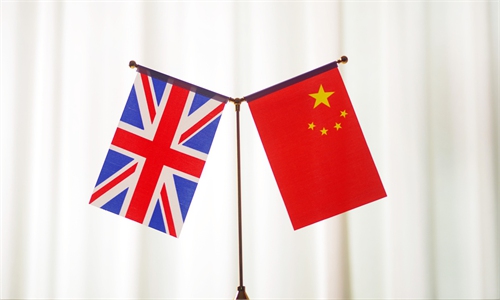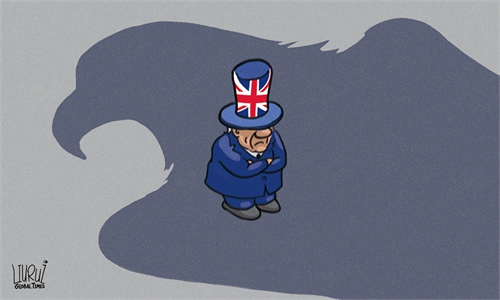UK’s ‘China hawks’ ruin efforts to reset ties as it weighs curbs on Chinese official visas

UK Illustration: Chen Xia/GT
After hyping claims of "China espionage" in recent months, the UK is now mulling curbs on the number of Chinese nationals who can enter the UK on official business and bypass normal visa checks, using the excuse of national security.
Though the policy is still under discussion and may take a long time before it is implemented, it reflects a strong anti-China force inside the ruling Conservative Party that Prime Minister Rishi Sunak must deal with, Chinese observers said on Thursday.
As the general election slated for the second half of 2024 approaches, the Conservatives could resort to more hawkish China policies and enhance their coordination with the US, analysts said.
British ministers and security agencies are debating an overhaul of border rules that apply to diplomats and others on official service, Bloomberg reported Wednesday, citing people familiar with the matter who asked for anonymity. The goal is to make China and other nations provide greater detail and allow more time for checks, they said.
Options include limiting how many people can arrive under diplomatic or similar rules, or restricting the scope of official or state-sponsored activities that don't require a visa, subject to greater advance checks, the sources said. The UK's security agencies support tougher rules to mitigate risk, they said.
Personnel exchange is key to the healthy development of China-UK relations and conducive to enhancing mutual trust and cooperation. China has long been providing convenience for British diplomats and officials and hopes the UK can provide the corresponding convenience for Chinese personnel, Chinese Foreign Ministry spokesperson Wang Wenbin said on Thursday.
Li Guanjie, a research fellow from the Shanghai Academy of Global Governance and Area Studies, told the Global Times on Thursday that the UK's latest move is consistent with its hyping of "China espionage threats" since 2023, but it will take some time for the internal debates to become practical policies.
A parliamentary committee warned last year that Britain's approach to the national security threat posed by China is "completely inadequate," while some officials said any move to limit diplomatic activities risked inflaming tensions with China at a sensitive time, media reported.
Zhao Chen, a research fellow at the Institute of European Studies under the Chinese Academy of Social Sciences, identified the fundamental anti-China sentiment among some British policymakers that even Sunak himself are finding it difficult to balance.
The nomination of David Cameron as foreign secretary in December 2023 was a chance to ease bilateral relations, but the Conservative government lacked the determination and boldness to grasp that opportunity, Zhao said.
Cui Hongjian, a professor with the Academy of Regional and Global Governance at Beijing Foreign Studies University, noted that the Conservatives, currently behind the Labour Party by 20 percent in the general election polls, should "seriously reflect on its foreign policy" after ruling for 14 years.
Echoing Cui, Zhao said the UK showed a strong tendency to follow, or at least coordinate with the US on international affairs, and is paying the price: at a time when European continental states are seeking to adjust relations with China and are being granted unilateral visa-free status, the UK has missed the chance despite its close economic interactions with China.



